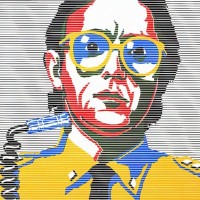Yes returns with a reworked song from the last time they issued an album without Jon Anderson. “We Can Fly,” composed by Trevor Horn and Geoff Downes, is the lead single from Yes’ forthcoming new recording on Frontiers Records Fly From Here, to be issued on July 1 in Europe and July 12 in the U.S.
The tune was first introduced as part of Yes’ repertoire more than 30 years ago, as the band toured behind 1980’s Drama. That album, aptly named, arrived amidst a similar bit of band unrest. When both Anderson and keyboardist Rick Wakeman quit, the pair was replaced by vocalist/producer Horn and keyboardist Downes of the Buggles — most famous for “Video Killed the Radio Star,” a No. 1 hit in the UK in 1979.
Here’s the new Yes version …
After the recent exit of Anderson, again, and also of keyboardist Oliver Wakeman (son of Rick), both Horn and Downes are back once more with Yes, though this time Horn is only working as producer. Stepping in on vocals is Benoit David, a former singer in a Yes tribute band out of Canada. Happily, David isn’t an empty replica of Anderson. While he has a credible reach into the higher ranges that have made the departed band co-founder’s legend, David works more comfortably a little lower — closer, really, to the area once claimed by Horn in the initial Yes version of this song. That allows the band to move beyond easy comparisons with Anderson, perhaps into a place where Yes — and this album — can be judged on its own merits.
Of course, Downes and Horn would later record still another take on “We Can Fly,” with the Buggles. That previously unreleased track finally saw the light of day on the 2010 reissue of 1981’s Adventures In Modern Recording. These three iterations provide an interesting road map into how a song evolves over time, and through personnel changes.
Check out this 1980 version, from Yes’ Drama tour …
It’s a largely similar arrangement, but there is a sharper, more metallic sound to guitarist Steve Howe’s playing in the interlude after the initial statement of the song’s theme. Then a keyboard signature — one you’ll hear more prominently in the subsequent take with the Buggles — ushers in this intriguing interplay between bassist Chris Squire and drummer Alan White. “We Can Fly,” as heard here, is leaner, at times almost new wave — a sinewy combination of Yes’ 1970s sound and this new pop-prog synthesis that would emerge on a reformulated Yes’ 1983 charttopper 90125 — not to mention in the off-shoot band Asia, which would feature both Howe and Downes.
[SOMETHING ELSE! INTERVIEW: Alan White talks about starting over with a new vocalist in Yes, his initial dates with the band, and favorite moments from working with David Torn, Tony Levin and John Lennon.]
Finally, here’s the Buggles version …
A far more electronic reading of the tune, “We Can Fly” suffers without Howe’s guitar, but there is nevertheless an interesting nihilism — typical of its time — to be found in this icy keyboard-driven rendition. The idea of flying away, on this edition of the song, seems more romantic, less possible, the product of a barren soundscape. It’s a sadder reading, almost like a requiem.
- Nick DeRiso’s Best of 2015 (Rock + Pop): Death Cab for Cutie, Joe Jackson, Toto + Others - January 18, 2016
- Nick DeRiso’s Best of 2015 (Blues, Jazz + R&B): Boz Scaggs, Gavin Harrison, Alabama Shakes - January 10, 2016
- Nick DeRiso’s Best of 2015 (Reissues + Live): John Oates, Led Zeppelin, Yes, Faces + others - January 7, 2016




Nice review! Really looking forward to this album…very pleased with what I’ve heard so far.
Good call on the differences. I got the 2010 Buggles version in May and find it superior to Yes for the reason you state. That version realy makes you feel Alone at the Airfield.
The new Yes version has great singing and playing, but it shouldn’t have been stretched to 23 minutes.
Having bought the album first, I went to the Birmingham show on 11/11.
After many years listening to Jon Anderson I approached the gig with more than a little curiosity. Benoit David demonstrated that he is a very, very capable replacement, adding a certain clarity to the vocal sound and looking very comfortable in the role.
I believe that this album is the best sound to come out of YES since 90125 and lays a strong foundation for the next. But please don’t keep us waiting so long for it!
Pingback: Yes, "Fly From Here Suite" from 'Fly From Here' (2011): YESterdays